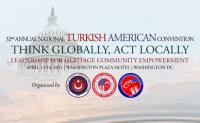The event, taking place between April 12-April 14, will feature numerous speakers discussing US-Turkish issues and public advocacy efforts, including TCA President G. Lincoln McCurdy.
McCurdy’s message to the convention highlighted the importance of expanding people-to-people exchanges between the United States and Turkey and Turkish American activism. Please read the full message below. For more information on the convention program, please visit here.
Message by G. Lincoln McCurdy
President, Turkish Coalition of AmericaGreetings to all participants and best wishes from the Turkish Coalition of America (TCA) for a successful ATAA Convention.
This conference is testament to a renewed spirit of teamwork and cooperation in the Turkish American community. TCA whole-heartedly supported this spirit since its founding in 2007, understanding that cooperation is essential for a strengthened Turkish American community and its representation in Washington, DC. This is why TCA has been providing major funding to ATAA and FTAA, and other Turkish American groups and has become a major sponsor of the past two national conferences.
The Turkish American community has come a long way. We do, however, still have a challenging and equally rewarding task ahead of us. This task is to increase the number of Turkish Americans who are knowledgeable about and engaged in civic and political affairs to the tens of thousands, which will create a strong Turkish American voice in the nation’s capital.
As TCA, we hope that our work helps to strengthen the community’s grassroots efforts and provides creative new outreaches and programs upon which to build a positive Turkish American civic agenda.
Since our foundation in 2007, in solidarity with Turkish Americans across the country, TCA helped make considerable strides in strengthening the voice of Turkish Americans in Washington. TCA spearheaded the campaign to increase the membership of the Caucus on US-Turkish Relations and Turkish Americans. I am proud to report that there are now 136 members in the Turkish Caucus as of April 1st and 42 states and territories are represented. We still have 12 states that lack a representative in the Turkish Caucus. I sincerely hope that participants at this conference from those 12 states - Maine, Vermont, Massachusetts, Rhode Island, Delaware, Iowa, Nebraska, Kansas, Utah, Nevada, New Mexico and Hawaii – will make a pledge to change that!
Since May 2009, when TCA organized its first Congressional Delegation to Turkey, TCA has become the third largest organizer of all educational foreign travel for members of Congress and staff, following the American Israel Education Foundation, an affiliate of the American Israel Public Affairs Committee (AIPAC). Altogether, TCA has brought 125 members and congressional staff on educational visits to Turkey. These trips have helped put Turkey and Turkish Americans on the map on Capitol Hill.
TCA is also investing in the next generation of the Turkish American community through scholarships and congressional internships. TCAdvance, the TCA Scholarship Program for Turkish American college students, provides bright and community-oriented young Turkish Americans an incentive to choose a career in public affairs, international relations or the media, while solidifying their bonds with the Turkish American community. 60 Turkish American students have benefitted from this scholarship since 2007, many students received it for repeat years. In addition, TCA so far provided 78 Turkish American young men and women the opportunity to learn about the American political process by interning at congressional offices, think-tanks and nonprofits in the nation’s capital through the TCA Washington Summer Internship Program.
We believe that a “people-to-people” civic platform is an important pillar of the US-Turkey relationship. However, Turkish Americans are a relatively small community. To strengthen the voice of Turkish Americans by expanding our circle of friends, TCA has reached out to various communities in the Unites States, including the Bosniak American, Macedonian American, Chaldean American, African American, Hispanic American and Native American communities through various grants and programs. These new friendships augment our existing close relations with the Azerbaijani and other Turkic communities and contribute to strengthening a balanced dialogue in Washington, DC on foreign policy issues affecting US national interests, Turkey and its region.
We also introduce the next generation of American minority leaders to Turkey through scholarships to choose Turkey and the Turkish Republic of Northern Cyprus as their study abroad destination. 200 American college students of minority descent, including Hispanic, Native and African Americans have received the TCA Study Abroad in Turkey Scholarship thus far, returning from Turkey as our goodwill ambassadors. In 2011, TCA also instituted the TCA Study Tour Grant for American universities. So far 8 American universities have benefitted from this grant and have taken their students to Turkey.
Last year, TCA awarded a grant to American Friends of Turkey (AFOT) to revive this long-standing organization which brings together Americans who have a connection to Turkey, bringing this constituency closer to the greater Turkish American community and assisting their valuable efforts to promote friendship between the two nations.
These programs belong to all of us who unite under the cause of elevating the image of Turks and creating people-to-people bridges between the United States and Turkey.
I would be remiss not to highlight the person who has made these contributions possible: our chairman, Dr.Yalcin Ayasli. With his wife, Dr. Serpil Ayasli, and their children, this family has made an extraordinary commitment. The work of TCA and our sister organization, the Turkish Cultural Foundation, is possible because of their outstanding generosity, foresight, commitment and, indeed, courage.
Finally, this year, we observe the 100th anniversary of the Balkan Wars. Millions of Turks, as well as thousands of Turkish Americans, trace their heritage to the Balkans and are refugees of the wars and ethnic cleansing which ravaged this region. It is incumbent on all of us to remember this history and help others understand that the 20th century was a period of great suffering for all, including the Turks. Especially this year, we should use every opportunity to educate our fellow Americans about this history.
I wish you a successful conference and a pleasant stay in Washington, DC.































